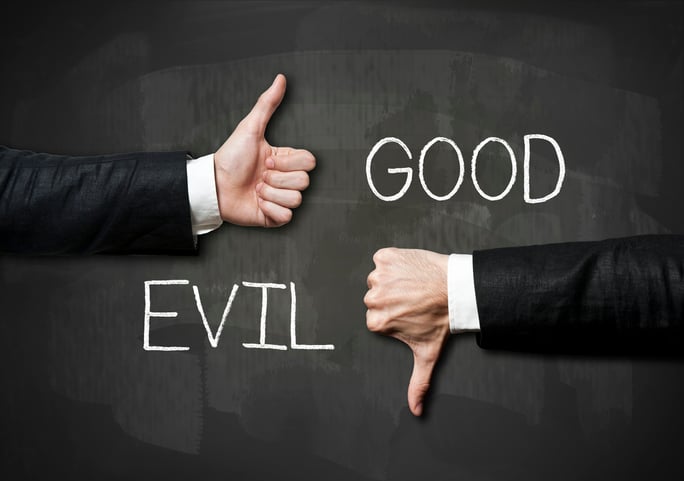Why the Confusion Between Good and Evil?
In a technologically advanced world, we are able to achieve amazing feats, yet why do we seem to lack the moral clarity to identify good and evil?

Should the United Kingdom leave the EU or stay? Is gay marriage okay or wrong? Is abortion a woman’s health issue or killing a human being? Are there two genders, or is gender a spectrum?
Were we created, or did we evolve? Is human life worth more than or the same as (or even less than) an animal’s life? Should we edit the human genome? Should immigration be limited or encouraged? Is lying okay?
Would you save your dog or a stranger?
It seems like many people today have lost the moral clarity to make solid, moral judgments. Take, for instance, the hypothetical scenario where your dog and a stranger are in a life-threatening situation, and you can only save one. Would you save the dog you love or the person you don’t know?
When this was actually asked to a group of people, almost 40 percent said they would save their dog, not the stranger.
That is just one example of a basic moral principle—the sanctity and value of human life—not being clear in many people’s minds today.
Why do so many people today struggle with a clear definition of right and wrong? Why are there so many conflicting views on moral issues?
The simple answer to that question is that many in our society have adopted a way of thinking academics call moral relativism. This is the idea that there are no moral absolutes, and each person develops his or her own right and wrong.
Yet, in contrast to that view, the Bible says there is absolute truth, and right and wrong can be clearly defined.
What is truth?
The prophet Daniel prophesied that in the end times, “knowledge shall increase” (Daniel 12:4). We live in the information age and are living in a world where this verse is being fulfilled. But, sadly, as knowledge has multiplied, truth has become more elusive than ever. In today’s society, it can be very difficult to discern between truth and lies—facts and propaganda. The Internet has become a vehicle for disseminating narratives to gain support and popularity, often at the expense of truth.
When He was on trial for His life, Jesus made the statement, “Everyone who is of the truth hears My voice” (John 18:37). Pontius Pilate responded with the famous rhetorical question, “What is truth?” (verse 38).
Pilate didn’t know, but hours earlier Jesus had defined truth in His prayer in John 17:17: “Your word is truth.” The Bible records for us the truth of God.
Sadly, as knowledge has multiplied, truth has become more elusive than ever.
Jesus’ simple definition of truth is valid because it hinges on two underlying principles: Jesus is God in the flesh, and God cannot lie (1 Timothy 3:16; Hebrews 6:18). But to accept these principles, one must first believe God does exist and the Bible is His inspired Word.
When we build a foundation on these core, fundamental truths, we have a solid basis for determining truth from lies—and right from wrong.
(We offer many resources to help you build this foundation. If you have not yet proven God’s existence, you may want to check out these resources: “Origin of the Universe,” “Design of the Universe” and our booklet Is the Bible True?)
The two trees
When God created the first man and woman, He placed them in the Garden of Eden. Within the garden were two special trees: the tree of life and the tree of the knowledge of good and evil (Genesis 2:9). God commanded that they were not to eat from the latter tree because it would result in death (verse 17).
These two trees represented two ways of life—obedience versus disobedience. One way of life leads to eternal life while the other way leads to suffering and death. The result of eating the fruit of the tree of the knowledge of good and evil is deciding for oneself what is good and evil and rejecting God’s authority.
As a result of Adam and Eve’s disobedience, human beings have gone down a path of rejecting God as the source of truth. Instead, the vast majority of people are influenced by their own human nature and Satan the devil.
The Bible doesn’t mince words when it comes to the topic of human nature. The prophet Jeremiah describes our hearts as “deceitful” and “desperately wicked” (Jeremiah 17:9). Left to himself, man’s ways don’t lead to good results (Jeremiah 10:23; Proverbs 28:26; Romans 8:7).
So, if we can’t trust in ourselves to determine what is right and wrong, what can we trust?
The time-tested and reliable moral code
Though mankind has generally rejected God (Romans 1:28), He has not left us hopeless. He is working out a plan to help mankind turn to Him and change (Jeremiah 31:34). He has given us a basic moral code that is immutable, is simple to understand and covers all aspects of life. That moral code is called the 10 Commandments (Exodus 20; Deuteronomy 5).
To learn more about these 10 laws that can give you a firm moral foundation, read our free booklet God’s 10 Commandments: Still Relevant Today.
Date Posted: September 5, 2019

 by Isaac Khalil
by Isaac Khalil

